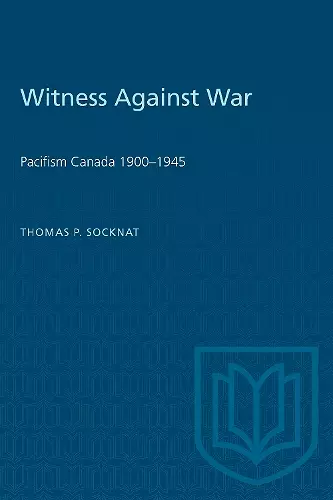Witness Against War
Pacifism in Canada, 1900-1945
Format:Paperback
Publisher:University of Toronto Press
Published:1st Jun '87
Currently unavailable, and unfortunately no date known when it will be back

Rallying today to the call for nuclear disarmament, the peace movement in Canada is strong and growing. But it is by no means new. In this study of pacifism during the first half of the twentieth century, Thomas Socknat explores a critical chapter in the Canadian peace movement’s history. Canada’s pacifist heritage, he argues, is rooted in two distinct but complementary traditions, the historic non-resistance of religious sects such as the Mennonites and the liberal Protestant and humanitarian tradition associated with the social reform movement.
The First World War radicalized pacifists, and the interwar era saw a resurgent peace movement shaped by a socially radical pacifism. During the Depression a pacifist-socialist alliance appeared to be in the vanguard of Canadian social action. But by the mid-thirties, pacifists found their pursuit of social justice in direct conflict with their commitment to non-violence. As social radicals began to abandon pacifism for the fight against fascism, the Canadian peace movement was severely weakened. Nevertheless, during the Second World War sectarian and non-sectarian pacifists joined in the defence of civil liberties and the individual conscience.
Socknat concludes that Canadian pacifists were a small but forceful minority who exercised a dual function in Canada: prophecy of an ideal of peace and reconciliation of social tensions. Above all, in its uncompromising emphasis on questions of conscience, the pacifist witness against war helped preserve those moral principles underlying Canadian culture and laid a solid foundation for the politicized peace movement of the nuclear era.
‘In this time of growing public awareness of the catastrophic consequences that nuclear war would have for Canadians, Witness against War is a timely reminder that the Canadian experiences of slaughter and suffering in World War I and World War II had already generated a reasoned protest against war as a mean of settling international disputes. Professor Socknat in his thoroughly researched history of pacifism in Canada builds a much needed bridge between the generation of which some have expressed a preference to be “red rather than dead” and the highly respectable Canadian historic pioneers in pacifism like J.S. Woodsworth, Nellie McClung, J.M.A. Grube, and Frank Underhill.’
George Ignatieff, author of The Making of a Peacemonger
‘In his carefully documented and well-written study Socknat traces the history of the Canadian peace movement from the early years of this century down to the end of World War II. Included in his narrative is the story of Canada’s conscientious objectors in both ward wars, among whom figure Quakers, Mennonites, Dukhobors, and Jehovah’s Witnesses, as well as men from the nonpacifist churches and from nonchurch backgrounds. He shows too the close connection existing in Canada between pacifist activity and the search for social justice.’
Peter Brock, Professor Emeritus of History, University of Toronto.
ISBN: 9780802066329
Dimensions: unknown
Weight: 652g
392 pages